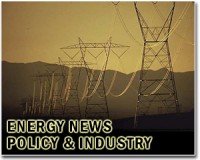 |
Brussels (UPI) Feb 22, 2011 EU officials are meeting a Russian delegation led by Prime Minister Vladimir Putin this week for difficult talks about Russian-European energy relations. The talks, scheduled for Thursday in Brussels, are aimed at tackling a number of issues, "from support to Russia's modernization process to trade and energy matters, from deeper technological cooperation to international affairs," the European Commission said in a statement. Energy dominates both powers' minds. Russia is the European Union's most important energy supplier, responsible for roughly 25 percent of the body's oil and natural gas consumption. To be fair, it's a mutual dependency: The EU accounts for 88 percent of Russia's total oil exports and 70 percent of its gas exports, the commission said. Readily available liquefied natural gas and new shale gas finds in the United States and Europe, however, are threatening Russia's position as a dominant supplier. Moreover, Brussels and the individual EU member states have been eager to diversify their imports away from Russia following price rows with transit countries that temporarily halted supplies to Europe. The third EU energy package, to come into effect next month, is aimed at strengthening the EU's diversification plans and liberalizing the market. It's also strongly opposed by Russia, which wants more security for its future supplies. Gazprom Chief Executive Officer Alexei Miller said Monday that the EU and Russia were working on such long-term import guarantees. "We are discussing issues covering the time the next decade, including a gas road map," Russian news agency RIA Novosti quoted Miller as saying. "We work on the basis of long-term contracts and we are to make forecasts with a high degree of probability to 2050." European companies have long complained about the nature of the long-term gas contracts struck with Gazprom, the Russian energy giant. The pricing for these contracts is linked to the crude oil price, which is currently much higher than the gas price on the different spot markets. The European industry wants to base contracts on spot prices, but Gazprom has refused. Miller says the company's negotiation position has improved ever since North Africa and the Middle East have been plunged into insecurity by widespread unrest. "As far as the Middle East and North Africa is concerned, we need to reconsider the question of reliability and stability of hydrocarbons," The Daily Telegraph quoted Miller as saying Monday. "I think the question of reliability and stability and safety of supplies from there should be analyzed and considered much more importantly than they were before these events."
Share This Article With Planet Earth
Related Links
 Australia's electricity prices to rise
Australia's electricity prices to riseCanberra, Australia (UPI) Feb 21, 2011 By 2015, Australia's electricity will cost more than double its 2008 price, a new study indicates. Among the factors responsible for Australia's energy price increases have been massive investment in transmission and distribution networks and movements in the wholesale markets driven by the country's droughts and mining boom, said the report, released Monday by the Australian Industry G ... read more |
|
| The content herein, unless otherwise known to be public domain, are Copyright 1995-2010 - SpaceDaily. AFP and UPI Wire Stories are copyright Agence France-Presse and United Press International. ESA Portal Reports are copyright European Space Agency. All NASA sourced material is public domain. Additional copyrights may apply in whole or part to other bona fide parties. Advertising does not imply endorsement,agreement or approval of any opinions, statements or information provided by SpaceDaily on any Web page published or hosted by SpaceDaily. Privacy Statement |